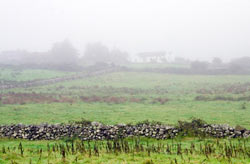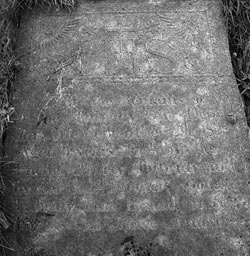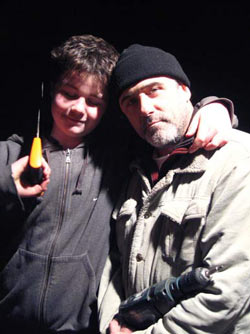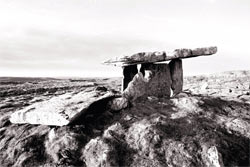
Image/Sound/Text:
The Process of Identity
Now that some time has passed since my field trip to Eire with Sarah Thomas on behalf of the Tate encounters project, I have had space to reflect on it and hope to put into words the act of being an insider /outsider in the place that I grew up.
Initially I never thought that I would have been so divided in my thinking as I was. But from day one I found that to be interviewed on camera about my birthplace put me in a position of having to be a Londoner explaining and describing what it was like as a child growing up in that place, or a tour guide giving a walk through a lost civilisation’s ruins. However, as the days went past I realised that when I wanted to explain something, I would refer to what it was like when I was a young man growing up as opposed to what it is like now. For example, what was once a pasture field, dedicated to the production of milk from dairy cows, is now a nursery for the growing of exotic plants and trees. But in my descriptions of the field, I saw it as it once used to be. That is not to say I disagree with what it has evolved to be, but somehow my mind prefers to recount such things as “there is where once a line of trees stood” and “I remember going to school through this field”. So from this I realised that the expression that I used when being interviewed, I live within the echoes of the past when I return home, and this would be a good description of how I feel. I also have become an insider/outsider in the place that I have always thought of as home. Looking back at the perception of home always seemed to give me a basis to my different travels and it was these roots that I would describe to people who would ask ‘where do you come from’? I would describe the landscape of West Clare and what it was like to have come from there. I would say that I was the son of a farmer and recreate the poetic idealist atmosphere in which I grew up. The unbound freedom of having vast areas of countryside to roam and to play, of living with nature and of the healthy living from providing your own food and the lack of commercialism that gave me and my family the ability to be self sustainable. The memories of working in the fields in the summer time with my brothers and sisters, of tending to animals in the depth of winter and of the many happy times we had in a carefree bubble where we never thought that changes from the bigger world outside would ever reach us.
In my younger years, memories of walking through dew laden fields making our way to school, and of the excitement of the Christmas with winter storms howling outside while we were warm and safe in our home. All of which went to create a perception of me being a true son of West Clare, and it in turn gave me the authority to be one of its ambassadors. However, over the last ten years as my life in London has now out numbered the time that I actually spent in Ireland, the memories of these times fade and are replaced by ones of my own life’s recollection. The memories of my own son being born and him growing up so quickly to being almost a man fill my mind. I was very lucky to have the presence of mind to want to and know the need to capture his development and that in the future my archive would act as a position from which he could use as mile stone.
From this, the need to capture the changes occurring to the place that I remember as a child have also become much more important to me. I feel that because my interest in the past is no longer a romantic one, or not even that of where I feel the need to preserve my nationality and cultural identity, I now concentrate on the pragmatic act of recording and preserving. This involves me photographing what little remains of areas unchanged from my childhood and also what the remainder looks like today. I interview mainly the older generations about what it was like in their youth, collecting stories and folklore, oral traditions and that of what has not been lost but easily forgotten. Over two years I have also been collating a catalogue of work, derived from photographs contributed by members of my family from as far back as I can in an attempt to archive these works and also to extend the length of the visual records of my predecessors before they are lost. Subsequently, the lack of images from the early years has shown me that the work that I do now is even more important.
One of the projects I have set myself, of which this field trip aided me in doing, is the tracing of my father’s extended family whose place in the family tree was lost due to the turmoil Ireland has seen over the last few hundred years. In the beginning it seemed to be reasonably easy to connect the family lines, especially as true to Celtic tradition the family connections were transmitted orally. However, with deeper investigation I found that these lines of lineages raised more questions than answers. One of the more difficult obstacles to overcome is the lack of records due to people’s displacement as a result of land clearance and migration from the 1700’s onwards. Parish records and head stones aid in that they record the names, births, marriages and deaths of some of these people but the more intimate records of extended family may sadly be lost forever.
Consequently, my vision of rebuilding the family tree has taken a turn to a more pragmatic approach to rediscovering the past to the point of which I can clearly show that that is where my line of the Tubridy family comes from, or ‘this is as far back as I can go to show that this is the line of my own Tubridy family tree’. As for the present and the future my vision is to conserving visually the changes to not alone the landscape but its peoples and traditions for the next generation, not alone for myself but also for all the members of my family and their children’s children.
Migration from Ireland had been the main export of the country for hundreds of years, and in turn it produced many external Irish communities and the offspring of these communities have in turn created a new kind of tribe as it were with many descriptive titles such as the Irish Americans, London Irish etc. However, the description I have used on myself as being a Londoner returning to my birth place is not one of a new identity through a metamorphism because of living in London for twenty years or more, although it contributes to the limbo statues of insider / outsider on my return visits to Eire. As it stands my identity to a British person is that of being Irish, naturally! As I was born there and lived there for more than eighteen years, my accent is definable as it still has a distinctively Irish lilt to it, and even to some people completely incomprehensible. While on the other hand to some Irish people I am a West Clare man living in London with an accent that has been tainted with the English lilt, and of course the hallmark of typical London Irish –‘all right mate’?
But it is not my accent that makes me a Londoner or the fact that I have lived here so long. I feel that somehow having not lived in Ireland and not been present while it went through many changes has alienated me from the spiritual connection that tied me to it. In this, the feeling of partition and disconnection sometimes brings out the fervent I AM Irish mentality, where I overindulge in everything Irish, which on hindsight is nothing more than not wanting to let go and grasping for reassurance to booster my fading identity. Yet here I am now, and I must reassess my position within this cultural society. Am I Irish, London Irish, or a transient Celt who is to be undefined by my lack of an identity due to being ‘mid cultured’?
Is my true home a space between the place they call immigrant and that of Irish origin, and on my head stone they will write, ‘Here lays Patrick Tubridy, a man who left his home and was buried in this spot?’ And also! what of my children? Of which there is another on the way. Will it be that they will be considered to be Londoners /English / Irish etc? The consideration to raise my son as a cultural mix between myself and his mother seems to have had no adverse consequences, as now he says that he is Irish, Welsh, all of which he is proud to be as well as being English. So now I wonder, does being the person outside of the original Diaspora the one who causes the confusion? Will my children see me as the outsider? And no matter how long I live in this country and no matter how many of the mannerisms I take on and however much my accent becomes more English will it be that I am not from there.
Now for a parallel from history: when the Romans came to this country they divided and conquered, they brought their own brand of civilisation and convinced a certain amount of the local British Celtic tribes that it was better to be Romanised than to live as savage barbarians. But the Romans only stayed for a few hundred years and after they left the converted Celts were ones who became the ruling class. Even to the remainder of the non-converted Celts their over lords were a carbon copy of the their previous invaders. Looking around them they saw buildings and people who glorified the greatness of Rome while witnessing their culture being pushed back to the outskirt of this new civilisation. I wonder did these peoples think they were the insider/outsiders in their own country, and when talking about their own culture they felt as tour guides leading others through a landscape that even though was still visible had now given up the ghost of what it once was and resigned itself to be infiltrated and conquered from the inside?
The children! Of the fading Celt, did the parent accept that it was better for them to be part of what the new culture brought for survival reasons and to ensure that there would be a continuation of their genetic lineage no matter what form it took? Allowing their culture to fade as they were, hoping that what ever folklore, traditions, social, lifestyle they managed to pass on to them might remind them of where they came from and maybe one day return to.
My cultural history has a beginning and somewhere at this present moment it is developing into its new configuration. In an attempt to analyse to what extent previous generations have influenced the present, I must firstly understand what the culmination of generation’s of knowledge and culture present themselves in their offspring. Secondly, I have to look at myself, as the separated descendant of these peoples. Do I, and can I recognise the feeling of my cultural identity within the new surroundings it finds itself? Also, I need to discover if it has developed into a new kind of cosmopolitan culture? Thirdly, how does my son identify himself? Is his identity a mixed one or one of the bigger family within the city, fitting in as a vast mixed group that share their roots with many kinds of cultures?







